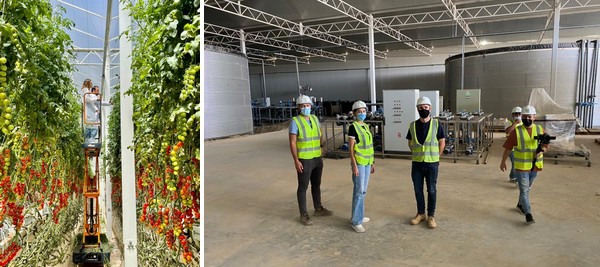The large Ever Given container ship is ‘partially refloating,’ but still stuck sideways in the Suez Canal, a crucial waterway, creating a massive traffic jam. Also for the horticultural industry, it is has consequences as many products and materials are being imported out of Asia. It is causing delays and this all is on top of the transportation costs that are already sky high since mid-December, due to the lack of containers. At the same time it shows the vulnerability of supply chains. "The canal is impacting everyone. It’s an example of how global supply networks challenge food security."
Delays
Dutch supplier Van Nifterik Holland, for example is waiting for 18 containers with bamboo sticks and other products for pot and vegetable plants. "We still have stock, it but if it will to take weeks, it becomes a very big logistical puzzle", Van Nifterik's logistics manager Henk Evers tells Dutch newspaper RD.
Also garden centers are dealing with the issue. In Norhtern Ireland, Robin Mercer, owner of the Hillmount group of garden centres, told NewsLetter.co.uk that some of his suppliers have products in container in this ship. “Everything is against us this year”, he says, also referring to the COVID-19 situation which made the NI government decide to close many shops, including garden centers. They have been closed since Christmas Eve, whereas garden centers in the UK have been open from Christmas to now.
Problem not immediately solved when ship set free
But when the ship will be set free, the problem isn't expected to be solved immediately. There is now flow of containers, which means that companies will have difficulties with ordering the containers. In addition, hustle is expected for when things do start moving again, and ports will 'suddenly' be flooded.
Transportation is a challenge since COVID-19
However, transportation is a problem for quite a while now, actually since the start of COVID-19. As we speak, there are also several ships waiting in the North Sea, says Rein Buitenhuis of Bunnik Creations, a Dutch company that imports ceramics from Asia, among other things, and has a number of containers waiting behind the Ever Given ship. "That is why a delay of a week has become standard recently. In many European ports, there are more ships than places to load and unload. This delay will now be made up for somewhat, but that is of course temporary."
Increased transportation costs
In turn, the challenges in transportation is reflected in the prices. "The price of transportation exploded", says Christian Jacobsen of EuroTrend, a Danish company that is specialized in designing and combining ceramics with mini indoor plants. "Transportation costs are about 4 to 5 times higher than usual, resulting in our products increasing in price as well."
Also for them, the current situation with the ship that is stuck in the Suez Canal is causing delays, but they still have enough stock. Mother's Day, for example is a very important holiday for them and they always ship their products together with their Valentine's Day shipments. According to Jacobsen, the main challenge is still the transportation price and for the second quarter, he does not expect the prices to decrease anytime soon. "It is really a sellers market - in favor of the shipping companies - nowadays and everyone importing from China is dealing with it."
Vulnerable supply chains
For the horticultural industry, the issue also shows why local food production is that important. "The canal is impacting everyone. It’s an example of how global supply networks challenge food security", says Sky Kurtz with Pure Harvest Smart Farms. "We’re used to being able to get year-round supplies of the fruits and vegetables we love flown in from other countries, regardless of what’s in season locally. But sometimes we get a reminder of how fragile the ecosystem we’re working in really is; how reliant we are on global supply chains."

"Other examples of the precarious nature of supply chains include the impact the pandemic had on air travel in 2020, the impact of war on regional airspaces, and natural disasters like the 2010 volcanic eruptions of Eyjafjallajökull in Iceland which caused massive disruption to air travel. These events underline the importance of food and supply chain security and independence," he adds.
The company has recently secured 60 million in growth funding to expand in local greenhouse production in the UAE. "For a region like the GCC where 80% of all food is imported, it should prompt us to think about reducing our reliance on other countries for our food and resources. In the past, the climate meant that growing food here was not possible, but with modern, climate-controlled greenhouses that’s no longer the case. Smart farms run by companies like Pure Harvest Smart Farms can utilise controlled-environment agriculture (CEA) to produce fresh, high-quality fruit and vegetables year-round."
